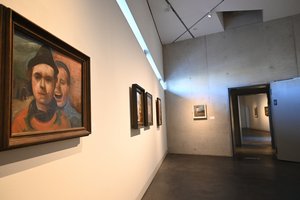
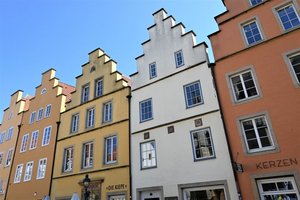
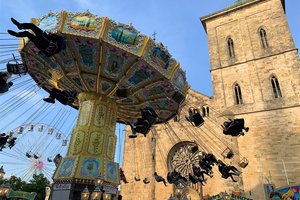
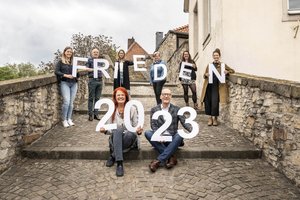
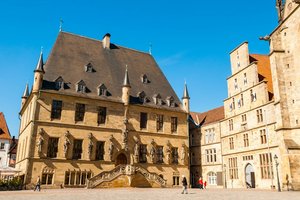
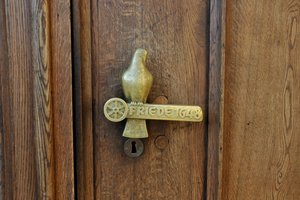
The society, which is dedicated to the legacy of the artist who was murdered by the Nazis, has adopted an important quote from Felix Nussbaum: "If I perish, don't let my paintings die," the Osnabrück-born artist once said. The aim of the Felix Nussbaum Society is to familiarise the public with the life and work of the painter. Accordingly, they initiate and organise projects and events that provide information about Felix Nussbaum, his life, his persecution and escape, his work in exile and finally his murder by the Nazis in Auschwitz.
The Felix Nussbaum Society was founded in 1987. It is partly thanks to the consistent commitment of its members that the plans to build the Felix Nussbaum House in Osnabrück in 1998 were realised. The museum building, designed by architect Daniel Libeskind, presents a large part of Nussbaum's oeuvre.
Since 2000, the members' magazine "FN-Nachrichten" has provided regular information about the society's activities as well as current research and events relating to the artist.
In order not to "let the pictures die", the society has commissioned 20 high-quality reproductions of Nussbaum's most important pictures. Professionally packed in transport boxes specially made for this purpose, the reproductions will be sent on tour under the motto "On the road with Felix Nussbaum" to be exhibited in important cultural and art centres in Europe.
"Our civic commitment is based on the deep conviction that the examination of the life and work of the painter Felix Nussbaum makes an important contribution to shaping an open and tolerant society," is how the members of the organisation describe their intention.
The aim of the Erich Maria Remarque Society, founded in Osnabrück in 1986, is to promote humanistic culture, art, science and research in the spirit of the author Erich Maria Remarque, who was born in Osnabrück in 1898, and to disseminate Remarque's pacifist ideas to the public. Remarque is quoted in the society's statutes: "My theme is the man of this century. The question of humanity. And my credo is that of the individualist: independence, tolerance, humour."
The society takes a public stand when tolerance is jeopardised and human rights or human dignity are violated, e.g. when it comes to people seeking refuge in our country from war or crisis zones.
The author, who became world-famous with his anti-war novel "Nothing New in the West" and whose books were publicly burnt by the National Socialists, always saw it as his duty to speak out when human rights and human dignity were violated. In this spirit, the members of the Remarque Society are active in the community today by promoting all kinds of peace activities, organising events, working with educational institutions, supporting research at the university and, above all, cooperating with the peace centre named after Remarque.
The Hans Calmeyer Initiative was founded in Osnabrück in 1995. From then on, the aim of the registered association was to continue researching, documenting and publicising the life and work of the Osnabrück lawyer. His work as a saviour of thousands of Jews during the Nazi regime is at the centre of the research.
According to the statutes, the association's work should be orientated towards the "exemplary attitude and exemplary actions of Calmeyer's personality". The aim is to promote the democratic organisation of the community in accordance with the Basic Law of the Federal Republic of Germany.
Tolerance and international understanding are at the centre of the association's work. In addition, the organisation is committed to combating all forms of discrimination, whether on ethnic, religious, ideological or political grounds. Civil courage and a willingness to resist, including against injustice by the state, should be encouraged.
In order to achieve these common goals, the Hans Calmeyer Initiative works closely with the Felix Nussbaum Society, the Erich Maria Remarque Society, the Augustaschacht Initiative and the Gestapo Cellar Memorial Association in the castle. The informal "Five Associations" network was initiated for the purpose of joint activities.